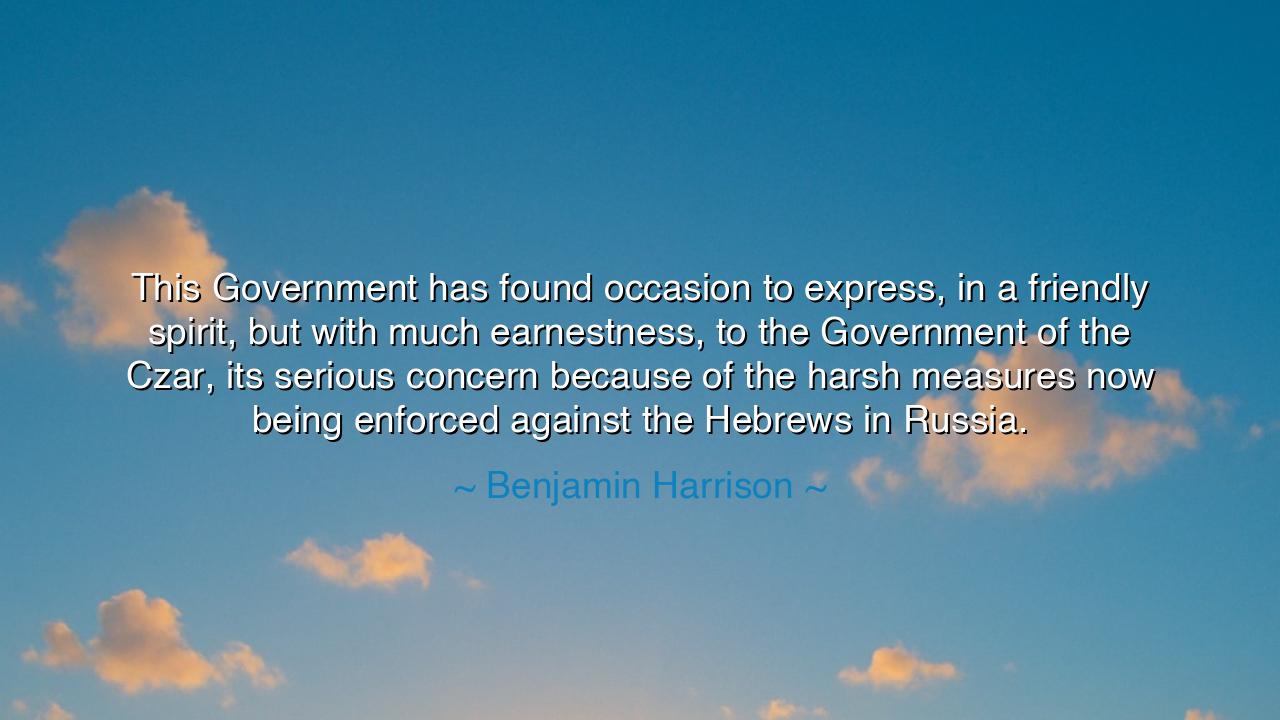
This Government has found occasion to express, in a friendly
This Government has found occasion to express, in a friendly spirit, but with much earnestness, to the Government of the Czar, its serious concern because of the harsh measures now being enforced against the Hebrews in Russia.






Hear, O listeners, and ponder the noble words of Benjamin Harrison, the 23rd President of the United States: “This Government has found occasion to express, in a friendly spirit, but with much earnestness, to the Government of the Czar, its serious concern because of the harsh measures now being enforced against the Hebrews in Russia.” These are not the words of diplomacy alone—they are a cry of conscience, a declaration that even amidst the formalities of statecraft, the voice of human compassion and moral duty must not fall silent. Harrison’s statement shines as a beacon of moral leadership, uttered at a time when the world often turned away from the suffering of the oppressed.
To understand the weight of this proclamation, one must return to the late nineteenth century, an age shadowed by the pogroms of the Russian Empire. In that dark era, Jewish communities across Russia were persecuted, their homes destroyed, their lives shattered by organized violence and state-sanctioned discrimination. Families fled across Europe and across oceans, seeking refuge from cruelty masquerading as law. It was in this climate that Harrison’s administration, though distant from the turmoil, raised its voice in protest—not as an act of interference, but as an assertion of moral solidarity. The President, guided by the conviction that human dignity knows no border, reminded the world that silence in the face of injustice is itself a form of complicity.
This moment marks one of the earliest examples of American moral diplomacy, where the government of a free people used its influence not for conquest or gain, but for the defense of human rights. Harrison’s words were directed to the mighty empire of the Czar, yet behind them stood the conscience of an entire nation—a people who had themselves been forged in the fires of oppression, who knew that liberty must be shared to remain pure. Thus, in this act, America began to step into its moral role on the world’s stage: not merely as a land of the free, but as a defender of freedom itself.
In this light, Harrison’s statement transcends its political moment and becomes a universal testament. It reminds us that governance without morality is barren, and diplomacy without conscience is deceit. The “friendly spirit” of which he speaks is not weakness—it is the strength of compassion guided by wisdom, the understanding that the highest form of power is the refusal to be indifferent to suffering. It is a lesson older than kings and younger than every sunrise: that justice must be spoken even when it is inconvenient, and mercy must be offered even to those beyond our reach.
History provides echoes of this same courage. When the United States later condemned the persecution of Armenians under the Ottoman Empire, or when Eleanor Roosevelt championed the Universal Declaration of Human Rights, they followed in the same moral tradition that Harrison embodied. For the call to defend the persecuted—be they Hebrews in Russia, or any oppressed people—flows from the same eternal source: the belief that the worth of a nation is measured not by its wealth or armies, but by its moral witness before humanity.
Yet, Harrison’s words also carry a warning: that the moral fabric of civilization depends upon empathy and vigilance. When nations avert their eyes from cruelty abroad, they teach their own citizens to tolerate injustice at home. The line between indifference and decay is thin, and the world has often crossed it to its sorrow. Thus, Harrison’s declaration is not only a message of compassion—it is a summons to all generations to act when conscience calls, to speak when silence tempts, and to remember that every act of moral courage strengthens the chain that binds mankind together.
The lesson is clear and timeless: power must serve principle, and diplomacy must serve humanity. Let each person, whether ruler or citizen, understand that the defense of the vulnerable is the truest measure of strength. Learn, therefore, to listen for the cry of the oppressed, even when it echoes faintly from distant lands. Support justice, speak for peace, and remember that the smallest act of solidarity can shake the foundations of tyranny.
So let the words of Benjamin Harrison live on—not as relics of a bygone age, but as living fire in the conscience of all who govern and all who are governed. For when one voice dares to speak for the voiceless, even the might of empires begins to tremble, and the enduring light of humanity shines more brightly against the long night of history.






AAdministratorAdministrator
Welcome, honored guests. Please leave a comment, we will respond soon